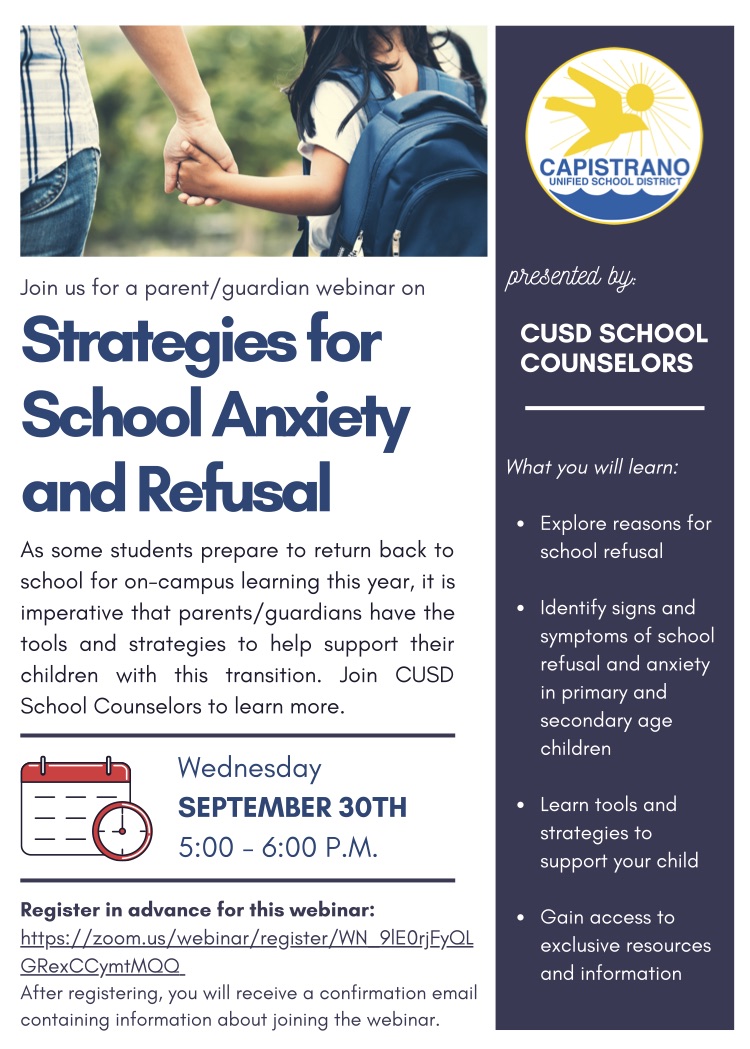By Lou Ponsi
With some students on the verge of returning to school campuses for in-person learning, the Capistrano Unified School District wants parents to know effective strategies to help their children have a more seamless transition from virtual learning to the classroom.
For that reason, a team of 10 district counselors who work with students in grades K through 12 will be presenting an hour-long webinar titled “Strategies for School Anxiety and Refusal.”
The webinar, which takes place from 5 to 6 p.m. Sept. 30, will focus on the reasons youngsters may experience anxiety and even refuse to return to the classroom.
Anxiety and refusal are issues parents need to confront every year, but especially this year because of the coronavirus, CUSD counselor Georgina Flores said.
“Kids are already talking about (returning to the classroom) and I think they are all excited for it,” Flores said. “But I think some kiddos don’t realize yet what the transition is going to be like, especially the younger ones, and maybe some middle school and high school kids have also gotten used to working from home … We just want to equip parents with some strategies.”
During the webinar, parents will learn to identify symptoms and signs of feelings associated with refusal and anxiety, Flores said.
Counselors will discuss the reasons for school refusals, whether due to the coronavirus or other causes.
Some children, for example, are simply reluctant to leave their families, Flores said.
Other students may have become accustomed to virtual learning and might not want to return to the classroom, the counselor said.
Also, when students do return to the classroom, the school environment will look much different than what they are used to, she said.
Class sizes will be smaller and social distancing and masks will be mandated.
Some familiar activities may not be taking place.
“It’s not going to be a typical start of the school year,” Flores said. “So we are going to explore all those reasons and then we are going to look at the signs and basically what it looks like for a child to show refusal and have anxiety about going to school. And that will look different across each grade level.”
Presenters in the webinar will talk about the importance of modeling positive coping strategies.
“Teaching parents how they can basically show their kids how to manage their stress in a stressful situation. Kids are always watching so I think modeling is a very important one,” Flores said. “Kids sometimes feel crazy feelings. They don’t know what is going through their head so they might get some of the physical feelings such as an upset stomach or headache, so teaching the kid to be able to connect those … and then being able to take steps to do something about it rather than letting it spiral out of control.”
Limiting children’s exposure to the mixed messages and false information on social media is another key strategy that will be discussed.
“It’s kind of hard to control what kids are seeing because of devices and the news and all that,” Flores said. “But with parents, especially with elementary age kids, (it’s important to limit what) their kids are exposed to so they don’t get false information or mixed information.”
The webinar will feature four presenters: one for elementary, one for middle, one for high school and a presenter who will discuss the district’s attendance policies.
A question-and-answer period will follow the presentations.
”We are going to go over the tools and strategies for parents and what they can do to help … and some of the tips we have and what they can practice,” Flores said. “That way, their kids feel more of a smooth transition.”

